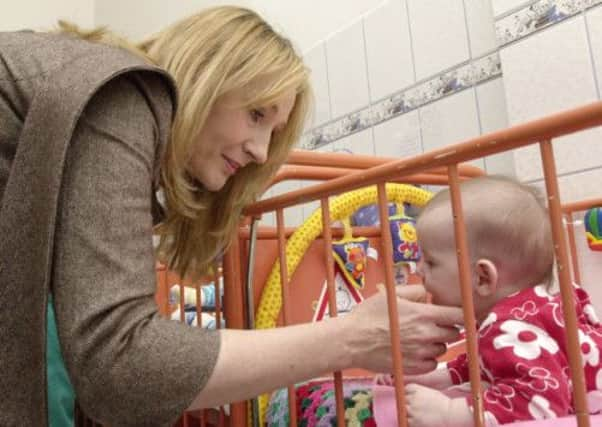JK Rowling considered taking a baby from orphanage


The Harry Potter author, whose charity Lumos has invested millions of pounds in building alternative children’s homes, said she was driven to consider the illegal act by the child’s “cold and frightening” surroundings, which she said were like a prison.
In an interview to highlight the ongoing plight of a million children trapped in government institutions in eastern European countries such as Moldova, Romania, the Czech Republic and Ukraine, Rowling said: “I’m an emotional person. I struggle with that a lot in this kind of situation.
Advertisement
Hide AdAdvertisement
Hide Ad“There was one little baby, a girl, and I was standing at this cot and I just thought, ‘I will take her’. It was irrational but that’s your human response. There was no earthly way I could take this baby home but that is your most powerful reaction. You think as a mother, ‘I will save this baby, this one baby’.”
Instead, she left the child in her cot, but has spent millions of pounds in a bid to reform and close unsuitable state-run orphanages and open a string of replacement homes.
In a fortnight, Rowling will host an event at Warner Bros in Hertfordshire, where the Harry Potter films were made, to highlight the continuing plight of Europe’s forgotten children. For the past seven years Lumos, named after a Harry Potter spell and whose operating costs are entirely funded by Rowling, has worked in the poorest nations in Europe to cut the number of children in bleak “workhouse” institutions.
The writer is also planning to expand the work of the children’s charity to Britain.
The Edinburgh-based author, who is worth an estimated £560 million, said she still worries about money which she explains is a legacy of her earlier life as a single mother when her evening meal would sometimes consist of a single rich tea biscuit.
She said: “There’d be nights when I had one Rich Tea biscuit and that was dinner... I still worry about money. Funnily enough it bears no relation to what is in your bank account, it is purely emotional.
“I was as poor as it’s possible to be in this country. I was a single parent. They key phrase is ‘in this country’ because we have the welfare state.”
Advertisement
Hide AdAdvertisement
Hide AdShe sees parallels between the plight of her hero, Harry Potter, and the children she is determined to help.
“Harry has been left in a very hostile environment, so there are clear parallels,” she said. “He is a boy removed from his family by bereavement.”
Rowling, who testified to the Leveson Inquiry into press standards, said there had been an improvement in the newspaper industry in recent years and that her rapid success and the subsequent press intrusion would have been easier to cope with if it had happened today.
“In 1997 it was like the Wild West,” she said. “If Harry Potter happened now, I’d have a different experience. I have felt a change and it’s really welcome. It has largely disappeared those mysterious phone calls trying to get information out of you.”
She also denied that she was ‘anti-middle class’, an accusation levelled at her following the portrayal of middle class characters in her novel, A Casual Vacancy. “I’m not anti-middle class in the slightest. Look at me. I am very pro people putting time and money and effort into trying to improve the world.
“And the middle classes do that very, very well. I would be the last person to deny that, being middle-class myself.